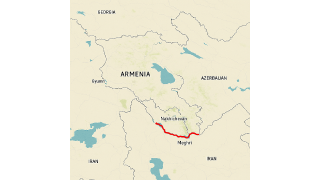
Letter from Venice Commission concealed

According to 168.am newspaper’s source from the Government of the Republic of Armenia, on Friday, Prime Minister Nikol Pashinyan received a letter containing rather harsh assessments from the Venice Commission which, however, the Government of the Republic of Armenia hadn’t published until yesterday.
According to our source, the Commission condemned Pashinyan’s call to block the entrances to and exits from courts and the direct involvement of the ruling party’s MPs in the court blockade.
According to the same source, the Venice Commission said the actions of the Prime Minister and his team were conditioned by the release of second President of Armenia Robert Kocharyan and were concealed under the veil of the fight against corruption.
The Commission examined all the statements made by the Prime Minister and government officials during those days, and this served as a ground to give a complete assessment. According to our source, the Venice Commission is preparing to issue a statement and send relevant letters to several international organizations soon.
Yesterday, in an interview with 168.am just hours after the release of this information, Spokesperson of the Prime Minister of the Republic of Armenia Vladimir Karapetyan declared that Nikol Pashinyan had received a letter from the Venice Commission, but according to Karapetyan, it was not a letter criticizing the Prime Minister.
“The President of the Venice Commission agreed with the evaluation that the judicial system does not enjoy public trust and expressed willingness to assist in the implementation of reforms planned by the authorities. Both the authorities and the Venice Commission believe the reforms need to be implemented within the scope of the Constitution and Armenia’s international commitments.”
Afterwards, Karapetyan added that the letter from the Venice Commission would soon be published on the official “Armenpress” website.
Why didn’t the Government of the Republic of Armenia immediately publish the letter of the Venice Commission? To put it mildly, this doesn’t come as a surprise, taking into consideration the fact that, on the same day that Nikol Pashinyan made the well-known call, the Government of the Republic of Armenia was officially disseminating the assessments of international organizations following the call of Pashinyan through another website (the website of the Government of the Republic of Armenia), not “Armenpress”.
And so, last evening, “Armenpress” disseminated the letter of President of the Venice Commission Gianni Buquicchio which, according to the news website, reads as follows: “…Recently I got to know about your calls over carrying out decisive reforms in the judicial system and even applying the tool of vetting. You mention with regret that the judicial system does not enjoy public trust and consider that bribed and incompetent judges should resign or be dismissed.
Undoubtedly, public trust towards the judicial system is among the key components of an effectively operating democratic country, and I am aware that, painfully, the trust towards the judicial system is not sufficient in Armenia.
The Venice Commission has supported reforms and even the process of implementing vetting in other European countries that were in the same situation.
But I have to underline that the Venice Commission also reaffirms that the reforms in the judicial system should be developed and carried out through legal measures, in accordance with the Constitution and taking into account the rule of law and the European criteria over human rights. Such reforms can reach their goal of strengthening rule of law and can foster the implementation of democratic aspirations in your country only if those criteria are respected.
The Venice Commission is ready to support you in elaborating the reforms aimed at restoring public trust towards the judicial system of Armenia, respecting the Constitution of Armenia and relevant international standards”.
As to how harsh or mild this assessment is, it is a matter of taste.
However, there are some considerations. First, let us mention that the letter published by “Armenpress” is translated, and the copy of the original letter in English is not presented. Moreover, the bottom line of the English-language letter in the English section of the website states that the letter was edited and translated from Armenian by Tigran Sirekanyan, one of the representatives of the website.
This means that “Armenpress” hasn’t received the original version of the English-language letter either. Question: Why hasn’t the original version of the letter been provided, if the letter from the Venice Commission was in English? We expect to see the Government of the Republic of Armenia publish the photocopy of the original of the letter of such a major partner for the Republic of Armenia in order to fix the situation; the photocopy of the letter is of significance for Armenia in terms of politics, the public and law.
Question: Why had the authorities been concealing the letter until yesterday, especially when, according to them, the letter was positive and was what they wanted to read? Why were they compelled to publish it only after 168.am released information yesterday?
After all, the presses could have and can address the Venice Commission and obtain the letter.
The next consideration is that, even if we accept the fact that this translated text published by the authorities fully complies with the original, it becomes clear that the Spokesperson of the Prime Minister isn’t truthful, to say the least.
In this text, Gianni Buquicchio and the Commission not only fail to assume the commitment to support the reforms planned by the Armenian authorities, but also clearly state the following:
“I have to underline that the Venice Commission also reaffirms that the reforms in the judicial system should be developed and carried out through legal measures, in accordance with the Constitution and taking into account the rule of law and the European criteria over human rights”, “respecting the Constitution of Armenia and relevant international standards”.
In the diplomatic language, this means ‘you have violated the constitutional order, and this is unacceptable’.























